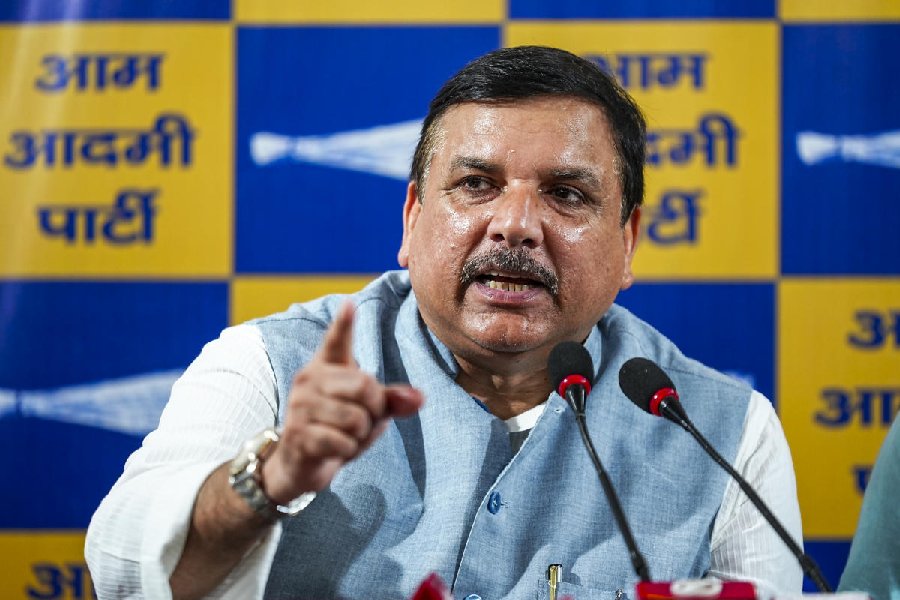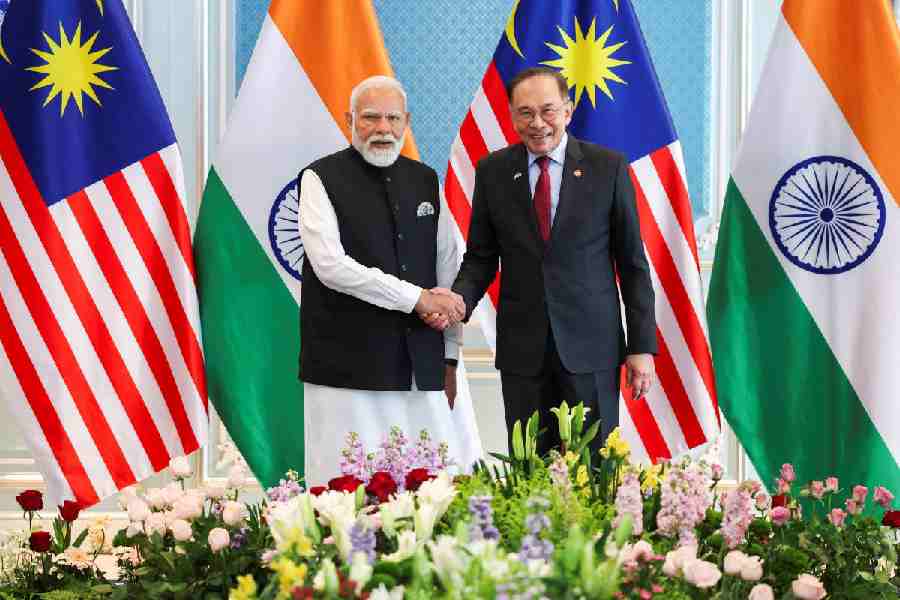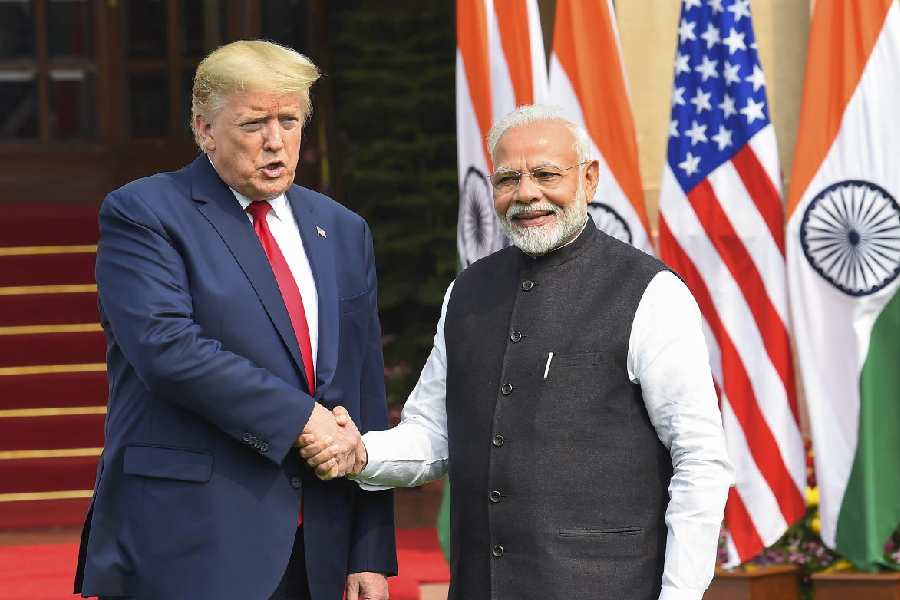
When the new king of Saudi Arabia was talking to Narendra Modi on Monday, last week, at the elbow of Salman bin Abdulaziz al Saud was a bright young thirty-year-old man. The young prince, Mohammed bin Salman al Saud, is to the oil-rich kingdom what Modi was to the people of India last year when they gave him a decisive mandate to govern from New Delhi. Both the prime minister and the thirty-year-old prince represent generational change in the public lives of their respective countries. Just as India's aspirational youth readily entrusted their destiny to Modi, Prince Mohammed, who has metamorphosed in a short time from an inexperienced lawyer into one of the most powerful men in Riyadh, embodies the hopes of the Saudi people at a time when they face an existential crisis without precedent.
This is obvious from stories that have recently been circulating within the kingdom and in London's Arab media, which are scanned thoroughly by Arabists for clues about the future of West Asia. Those are tales of how the little prince, well before he entered his teens, was already playing war games with other princelings in shopping malls in Riyadh and Taif.
The House of Saud does not build a personality cult in the crude or cruel style of Saddam Hussein or use the populism that made Gamal Abdel Nasser not just an Egyptian hero but also a pan-Arab, pan-African one. Its methods are unique and Prince Mohammed knows it. He also knows that he is Saudi Arabia's man of destiny. He was at the elbow of his father, King Salman, when the phone conversation with Modi took place for two reasons. One, the king who is eighty, is known to be suffering from severe dementia: so it is absolutely essential that someone trustworthy is there to hold his hand at all times in the discharge of duties as head of State. Two, Mohammed is fascinated by Modi: they are like mirror images of each other, both representing identical streams of public persona albeit in vastly different settings. Saudis at the highest levels are curiously fascinated by India. Sadly, there is little appreciation of this in the Modi government.
Protocol may come in the way, otherwise it would be good for the vice-president, Hamid Ansari - who had two distinguished innings as ambassador in Riyadh - to give a tutorial on Indo-Saudi relations to those who craft the National Democratic Alliance government's Gulf policy at the political level. Ansari could tell those in the NDA, who can't see the kingdom beyond its custodianship of the two holy mosques, an anecdote which would make saffron jaws drop. Once upon a time, Prince Saud al Faisal, the world's longest-serving foreign minister, was holding a press conference at the end of his visit to Islamabad. Pakistani journalists were haranguing him about the 'plight' of Indian Muslims in the hope that they could extract some critical statement from the visiting foreign minister about India. Prince Saud, a master of spin who has repeatedly had the White House press corps eat out his hands, would not oblige. In the end, they became aggressive and Saud uncharacteristically lost his temper. He told Pakistani journalists that Muslims are not a minority in India. "One hundred forty million [then] people do not constitute a minority." He made it plain that Indian Muslims did not need Pakistanis to plead their case. The journalists were stunned into silence after the foreign minister let out steam.
With that kind of goodwill for India within the House of Saud, it was not surprising that the kingdom's rising son was fascinated by Modi. He was determined to be in on the phone conversation also because he is the architect of the war in Yemen, which may only be beginning. In addition to being Saudi Arabia's defence minister, Prince Mohammed heads the royal economic council: it is a body that is akin to the National Economic Council, which was set up in the White House by Bill Clinton two decades ago. That means that if the Saudis decide to invest in Modi's "Make in India" campaign, it will be the young prince who will take the decision to loosen the kingdom's purse strings. Mohammed is also chef de cabinet to the king. That makes him his father's gatekeeper.
All of which gives an idea of how Modi wasted an opportunity, which may probably never present itself again to shape Riyadh's attitude to the NDA government by talking on and on about the evacuation of Indian nationals from Yemen. What Modi discussed with Salman could have been handled by his ambassador in Riyadh. Many of Modi's conversations with world leaders, according to credible accounts, must make those leaders wonder if he is still the chief minister of Gujarat. But his conversation with the Saudi King was the nadir: Modi reduced himself from Prime Minister to the level of India's envoy to the kingdom.
All over the Gulf and West Asia, young men like Mohammed are now the rule rather than the exception. After Modi met Sheikh Tamim bin Hamad bin Khalifa Al Thani, the emir of Qatar, a few days ago in New Delhi, he is said to have expressed surprise at how young the Sheikh was. Indeed, the emir is the world's youngest hereditary ruler, having taken charge as emir at the age of 33. In 1999, it was King Abdullah of Jordan who began this trend when he succeeded his father, Hussein, whose reign over the Hashemite kingdom lasted three years short of half a century. Abdullah was only 37 when he became king. At that time, the new king and his Palestinian consort, Queen Rania, were like a breath of fresh air in a region that had become jaded with stereotype autocrats.
A year later, Bashar al Assad, then 35, followed in Syria where he succeeded his father, Hafez al Assad, whose iron rule lasted 29 years. The same year, Bashar, an ophthalmologist by training, married his British-Syrian girlfriend, Asma. It is an irony that, together, Bashar and Asma were expected to change Syria. They did change it, but not the way that the world expected. The Assad family was unable to cope with the rising tide of the Arab Spring and Syria is now a wasteland, a reminder that generational transition of power has to be handled with great care.
The next big succession in the region is likely to be in Oman, where the 74-year-old sultan, Qaboos bin Said, is ailing. Qaboos, a Sandhurst graduate, became sultan himself at the age of thirty when he overthrew his father, who truly fitted classical descriptions of an Oriental potentate with his primitive ways of running the country.
When Modi came to power, there was a genuine expectation that he would think out of the box on India's relations with Saudi Arabia and change the dead-ended practice of looking at Riyadh merely through the prism of Islam and Haj pilgrimage facilities for Indian Muslims. For that matter, the hope was that South Block would look beyond the Gulf's non-resident Indian immigrant population in dealing with these states in India's extended backyard.
Saudi Arabia would love to be treated as a normal country by India, which the latter has attempted to do in fits and starts, but they have always been false starts. For example, Modi could send a non-Muslim as ambassador; no previous government has done this. Indeed, such is the shortage of Muslim diplomats who could fit the shoes of an envoy to the kingdom - several Muslim Indian foreign service officers have simply put their foot down and refused to go to Riyadh - that thrice India had to send the same ambassador on repeat postings in Riyadh. The incumbent there, Hamid Ali Rao, retired last year. But he has been asked to continue while the search is on for a Muslim successor.
In his ten months in office, Modi has not handed out a diplomatic posting to a political appointee: his preference so far has been for career personnel. But in a clear sign that the prime minister will not think out of the box on Saudi Arabia - as his phone conversation with King Salman testified - Modi, through his external affairs minister, did sound out a very bright Muslim in his party about the job in Riyadh in succession to Rao. Wisely, the prospective political appointee turned down the offer because, in the absence of any fresh thoughts on relations with the kingdom, it would be merely more of the same thing.











